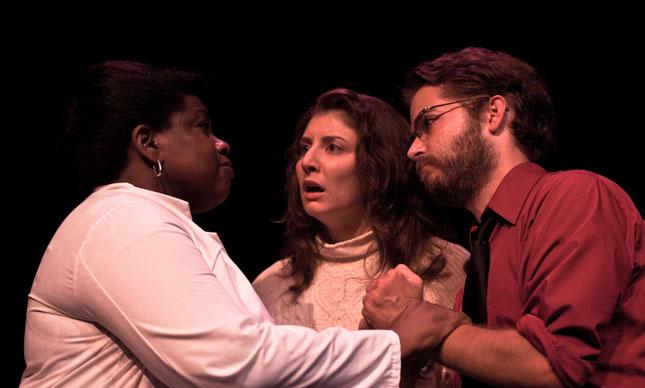‘Florida Days’
As part of the Fringe Festival this month, Rachael Bail’s “Florida Days” premiered at The Apothecary on July 10.
The play, performed by the McLean Drama Company, follows the journey of Betty, a Southern girl living in Brooklyn, New York. Betty, played by Elise Edwards, transforms from fiery young journalist to a wife and mother while her world crashes down around her. The audience seems transfixed by the depth of Edward’s talent. Her character’s chemistry with Thomas Linn’s character, Vincent, is equally apparent. The onstage couple carries the production with a truly convincing portrayal of two lovers facing life’s hardships while seeking the deeper meaning of it all.
The physical appearance of the production could be described as minimalist, with few costumes, about 10 props in all, and projected images on a back wall instead of sets. Yet nothing is lacking. The comparatively few materials only aid the intensity of the emotions portrayed. Even the audience’s seating seems to transform from a few church pews, since the first scene is a wedding, to benches in a blue-lit coffeehouse, when the action quickly transitions to New York City. The setting then remains in New York for most of the play, despite the title. The Apothecary, a tiny dance studio with exposed brick and unpainted wood, conveyed the sense of watching this family in their city home, living off of Vincent’s salary as an opera conductor.
Though the quality of acting from much of the supporting cast leaves much to be desired, Edwards and Linn give performances of which they should be proud. For a small community theater group the company showed potential, and will be a group to look forward to in future festivals.
I would give “Florida Days” three out of five Fringes.
No Gentlemen of Verona
Elizabethan English flows aplenty with this renovated Shakespeare play. “No Gentlemen of Verona,” Joshua Engel’s take on “Two Gentlemen of Verona,” takes place in the 1940s.
The time period works surprisingly well for the play, though the explanation of that specific adaptation is a bit hard to follow. According to the program, it was successful in Engel’s past experiment with “Much Ado About Nothing” and was thus chosen for the time period for this venture as well. Mobsters, Navy sailors and bright red lipstick make the setting work, however, and make the show more relatable to a modern American audience.
The Rude Mechanicals were as quick and witty as The Bard himself could have expected. The cast’s past experience with Shakespearean dialogue shows in their skillful delivery. It is obvious that the members of this all-female troupe not only know their lines, but they fully understand their meaning. In fact, it is as if they naturally speak Elizabethan English in their daily lives. The few trips over the complex lines were quickly remedied and never skipped a beat.
Overall, “No Gentlemen of Verona” is a comic delight for Shakespeare lovers that enjoy a new spin on an old favorite.
I would give “No Gentlemen of Verona” four out of five Fringes.


